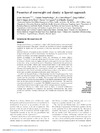Identificador persistente para citar o vincular este elemento:
https://accedacris.ulpgc.es/jspui/handle/10553/44798
| Título: | Prevention of overweight and obesity: A Spanish approach | Autores/as: | Aranceta, Javier Pérez-Rodrigo, Carmen Serra-Majem, Lluis Bellido, Diego De La Torre, Martín López Formiguera, Xavier Moreno, Basilio |
Clasificación UNESCO: | 32 Ciencias médicas 3206 Ciencias de la nutrición |
Palabras clave: | Randomized Controlled-Trial Health Consequences Physical-Activity Childhood Prevalence, et al. |
Fecha de publicación: | 2007 | Publicación seriada: | Public Health Nutrition | Conferencia: | 7th Congress of the Spanish-Society-for-the-Study-of-Obesity | Resumen: | Background. Obesity is considered a major public health issue in most developed countries nowadays. This paper provides an overview of current population data available in Spain and the approach to develop preventive strategies in the country.Methods: Review of population data available is based on individually measured weight and height as well as determinants. On this basis, the approach used in the country to develop preventive strategies is discussed.Results: According to the DORICA study, the prevalence of obesity (BMI >= 30 kg m(-2)) is 15.5% in Spanish adults aged 25-60 years (13.2% in men and 17.5% in women). Obesity rates are higher among women aged 45 years and older, low social class, living in semi-urban places. Population estimates for the prevalence of obesity in Spanish children and young people based on the enKid study are 13.9% for the whole group. In this study, overweight and obesity is related to absence of breastfeeding, low consumption of fruit and vegetables, high consumption of cakes, buns, softdrinks and butchery products, low physical activity levels and a positive association with time spent watching TV.In 2005, the Spanish Ministry of Health jointly with the Spanish Agency for Food Safety and Nutrition launched the multifaceted NAOS strategy for nutrition, physical activity and the prevention of obesity. The important role of the family and the school setting as well as the responsibility of the Health Administration and Pediatric Care in the prevention of obesity is highlighted in the document. The need for environmental actions is recognised. The PERSEO programme, a multicomponent school-based intervention project is part of the strategy currently in place.Conclusion: Obesity is a public health issue in Spain. A national multifaceted strategy was launched to counteract the problem. Environmental and policy actions are a priority. Young children and their families are among the main target groups. | URI: | https://accedacris.ulpgc.es/handle/10553/44798 | ISSN: | 1368-9800 | DOI: | 10.1017/S1368980007000699 | Fuente: | Public Health Nutrition [ISSN 1368-9800], v. 10, p. 1187-1193 |
| Colección: | Reseña |
Citas SCOPUSTM
74
actualizado el 08-jun-2025
Citas de WEB OF SCIENCETM
Citations
57
actualizado el 08-feb-2026
Visitas
179
actualizado el 09-ene-2026
Descargas
183
actualizado el 09-ene-2026
Google ScholarTM
Verifica
Altmetric
Comparte
Exporta metadatos
Los elementos en ULPGC accedaCRIS están protegidos por derechos de autor con todos los derechos reservados, a menos que se indique lo contrario.
